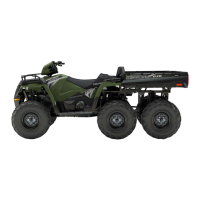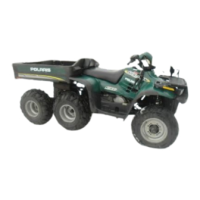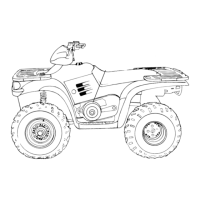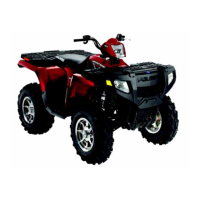MAINTENANCE
2.21
LIQUID COOLING SYSTEM
OVER
VIEW
The engine coolant level is controlled or maintained
by the recovery system. The recovery system
components are the recovery bottle, radiator filler
neck, radiator pressure cap and connecting hose.
As coolant operating temperature increases, the
expanding(heated)excesscoolantisforcedoutofthe
radiator past the pressure cap and into the recovery
bottle. Asenginecoolanttemperaturedecreasesthe
contracting(cooled)coolantisdrawnbackupfromthe
tank past the pressure cap and into the radiator.
Some coolant level drop on new machines is normal
asthesystemispurgingitselfoftrappedair. Observe
coolant levels often during the break-in period.
Overheating of engine could occur if air is not fully
purged from system.
PolarisPremium60/40isalreadypremixedandready
to use. Do not dilute with water.
COOLANT STRENGTH / TYPE
Test the strength of the coolant using an antifreeze
hydrometer.
Antifreeze Hydrometer
G A 50/50 or 60/40 mixture of antifreeze and
distilled water will provide the optimum
cooling, corrosion protection, and
antifreeze protection.
G Do not use tap water, straight antifreeze, or
straight water in the system. Tap water
contains minerals and impurities which
build up in the system.
G Straight water or antifreeze may cause the
system to freeze, corrode, or overheat.
Polaris 60/40 Anti-Freeze / Coolant
(PN 2871323)
COOLING SYSTEM HOSES
1. Inspect all hoses for cracks, deterioration,
abrasion or leaks. Replace if necessary.
2. Check tightness of all hose clamps.
CAUTION:
Do not over-tighten hose clamps at radiator, or radiator
fitting may distort, causing a restriction to coolant flow.
Radiator hose clamp torque is 36 in. lbs. (4 Nm).
RADIATOR
A
1. Check radiator (A) air passages for restrictions or
damage.
2. Carefully straighten any bent radiator fins.
3. Remove any obstructions with compressed air or
low pressure water.
COOLING SYSTEM
PRESSURE
TEST
Refer to Page 3.5 for pressure test procedure.

